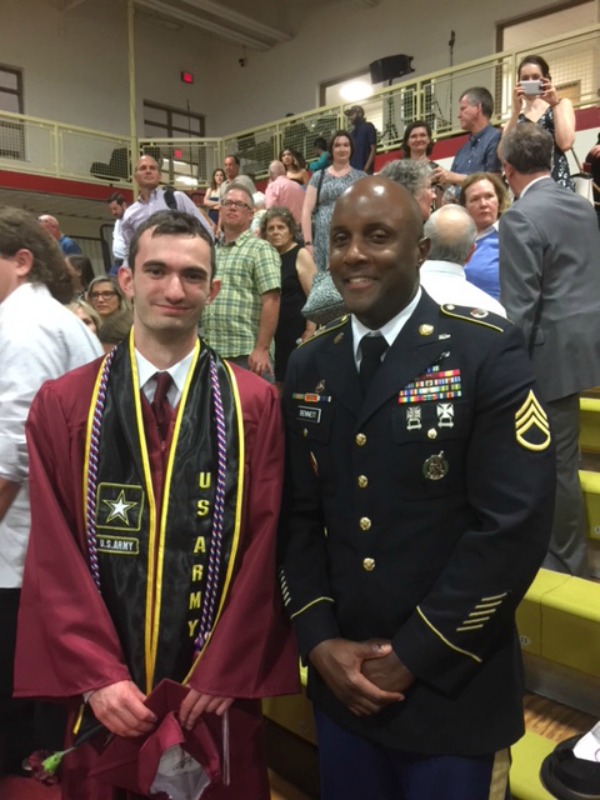
“The only thing I knew was that I love this country to death,” says Andrew McPhail, “and I wanted a career that could fill me with pride and honor.”
During his senior year at Verona High School, McPhail, a who graduated with the Class of 2018, was not set on a major or career path like most of his peers. Instead of applying to a bunch of random schools, he decided to enlist in the United States Army. (If you watched the VHS graduation 2018 video, you probably noticed a man in an Army dress uniform. That was McPhail’s recruiter, Staff Sergeant Gregory Bennett, who pledged to attend the graduation of every one of his recruits.) McPhail will be leaving for Fort Leonard Wood, Mo., on July 17, where he will begin basic training. He will have to serve the minimum of four years in the Army, then he can choose to stay on or pursue a career outside of the military. During these next four years, McPhail will train as a chemical, biological, radiological, and nuclear weapons specialist.
According to the United States Army Recruiting Command (USAREC), there are 33.4 million Americans ages 17 to 24, which is the demographic the military is trying to target. But when you break 33.4 million down into the people who are qualified and who have interest in enlisting, it comes out to only 136,000 people. This is a scary number for the military, and a number they are trying to improve. Justin Nielsen, a Verona Police officer and former member of the Army’s 10th Mountain Division, assisted McPhail in his decision to enlist. “I think the biggest thing that people probably don’t understand [about the military],” Nielsen says, “is that your career is not conducted as if you are constantly in basic training. Once you graduate and have a particular skill set, it becomes a job so you go to work everyday from morning until the afternoon and once you get off work you drive home and live a normal life. It’s a job like any other.”
There are many benefits to enlisting in the military after high school, the most obvious one is being able to take full advantage of the GI Bill, which covers tuition for anybody who has served in the military and wants to receive an education at a higher institution. The bill is not a form of financial aid because the money is paid directly to the recipient, not the school.
The military can be a great launchpad for an array of different careers. It can “help you find a career that you may be passionate about doing once you transfer back into civilian life” says McPhail. The Army does not just employ soldiers. They need almost every type of profession, that is why McPhail feels confident he will find his way in the military. McPhail is also excited to travel and explore new countries, which is another benefit of joining the military. “There are countless travel opportunities that will expose me to the world outside of the United States and allow me to explore different cultures,” McPhail says.
As Verona Board of Education Vice President Lisa Freschi learned earlier this year, the Army has been trying to reach students and teachers to convince them how different it is now and how many opportunities it offers. It shows them, for example, some of the technology that the Army now uses that could also be helpful in outside careers later.
Officer Nielsen believes the military will assist McPhail in many ways. “It’s gonna help him with his education,” he says. “He is going to have the discipline to accomplish whatever it is he wants to do. He is going to be able to gain a different perspective by traveling. Seeing how people live in other places all around world and most importantly participating in a very essential job right now to make sure that we are establishing safety for the people that live here.”
To enlist in the Army, you must be between the ages of 17 and 34, have a clean legal record, have a high school diploma or GED (General Equivalency Diploma, a test that measures a person’s high school-level academic skills), and be a U.S. citizen. “If you meet those requirements, the next step is to take the Armed Services Vocational Aptitude Battery (ASVAB). This test covers subjects like math, English, and science, as well as auto and shop information and electronics information. The grade received on the test will then determine which Army jobs you qualify for and you will be able to then choose which job you would like. “I would say some sections of the ASVAB were definitely harder than the SAT, but overall the SAT was harder,” says McPhail. The ASVAB showed that McPhail was prepared to train to be a chemical, biological, radiological, and nuclear weapons specialist. After that, the final step is to take the Army Oath of Enlistment and sign a contract agreeing to join the military.
“All of this together led me to thinking of the military as a viable option for me,” says McPhail, “where I would be able to represent the country that I love and I would be able to obtain the pride and honor that I sought.”
“What’s Next” is a series of profiles about what members of each Verona High School class intend to do after graduation. MyVeronaNJ has been publishing the series since 2010 and you can read all of them here.

